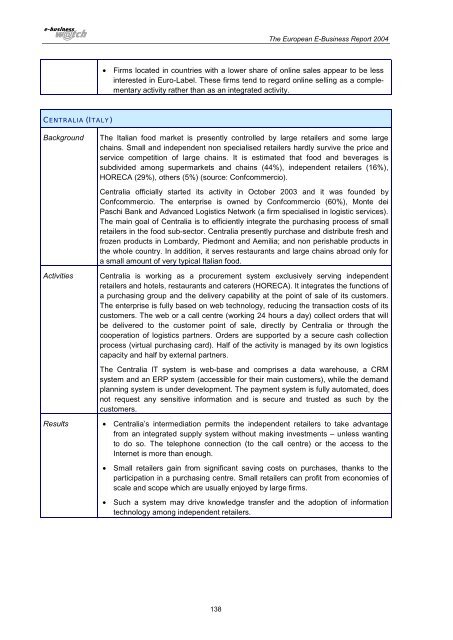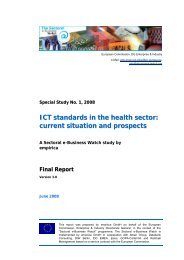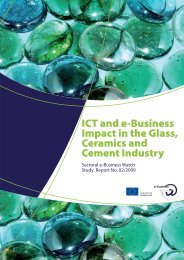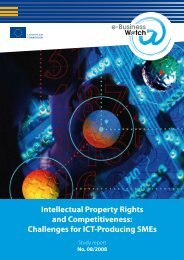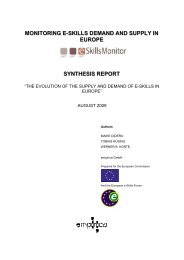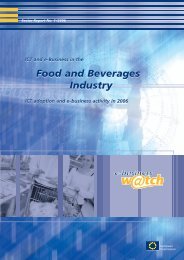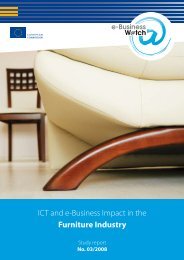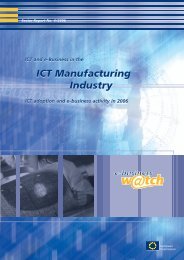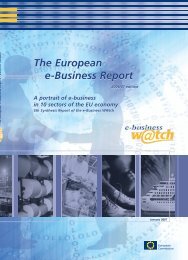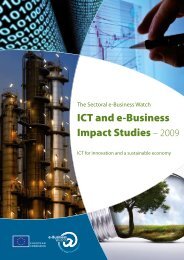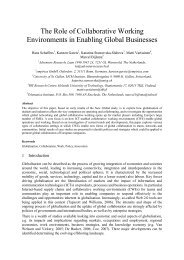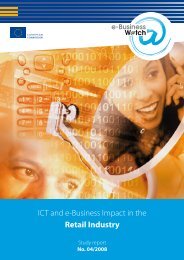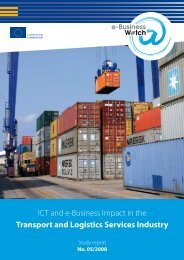The European e-Business Report 2004 - Berlecon Research GmbH
The European e-Business Report 2004 - Berlecon Research GmbH
The European e-Business Report 2004 - Berlecon Research GmbH
Create successful ePaper yourself
Turn your PDF publications into a flip-book with our unique Google optimized e-Paper software.
<strong>The</strong> <strong>European</strong> E-<strong>Business</strong> <strong>Report</strong> <strong>2004</strong>• Firms located in countries with a lower share of online sales appear to be lessinterested in Euro-Label. <strong>The</strong>se firms tend to regard online selling as a complementaryactivity rather than as an integrated activity.CENTRALIA (ITALY)BackgroundActivitiesResults<strong>The</strong> Italian food market is presently controlled by large retailers and some largechains. Small and independent non specialised retailers hardly survive the price andservice competition of large chains. It is estimated that food and beverages issubdivided among supermarkets and chains (44%), independent retailers (16%),HORECA (29%), others (5%) (source: Confcommercio).Centralia officially started its activity in October 2003 and it was founded byConfcommercio. <strong>The</strong> enterprise is owned by Confcommercio (60%), Monte deiPaschi Bank and Advanced Logistics Network (a firm specialised in logistic services).<strong>The</strong> main goal of Centralia is to efficiently integrate the purchasing process of smallretailers in the food sub-sector. Centralia presently purchase and distribute fresh andfrozen products in Lombardy, Piedmont and Aemilia; and non perishable products inthe whole country. In addition, it serves restaurants and large chains abroad only fora small amount of very typical Italian food.Centralia is working as a procurement system exclusively serving independentretailers and hotels, restaurants and caterers (HORECA). It integrates the functions ofa purchasing group and the delivery capability at the point of sale of its customers.<strong>The</strong> enterprise is fully based on web technology, reducing the transaction costs of itscustomers. <strong>The</strong> web or a call centre (working 24 hours a day) collect orders that willbe delivered to the customer point of sale, directly by Centralia or through thecooperation of logistics partners. Orders are supported by a secure cash collectionprocess (virtual purchasing card). Half of the activity is managed by its own logisticscapacity and half by external partners.<strong>The</strong> Centralia IT system is web-base and comprises a data warehouse, a CRMsystem and an ERP system (accessible for their main customers), while the demandplanning system is under development. <strong>The</strong> payment system is fully automated, doesnot request any sensitive information and is secure and trusted as such by thecustomers.• Centralia’s intermediation permits the independent retailers to take advantagefrom an integrated supply system without making investments – unless wantingto do so. <strong>The</strong> telephone connection (to the call centre) or the access to theInternet is more than enough.• Small retailers gain from significant saving costs on purchases, thanks to theparticipation in a purchasing centre. Small retailers can profit from economies ofscale and scope which are usually enjoyed by large firms.• Such a system may drive knowledge transfer and the adoption of informationtechnology among independent retailers.138


